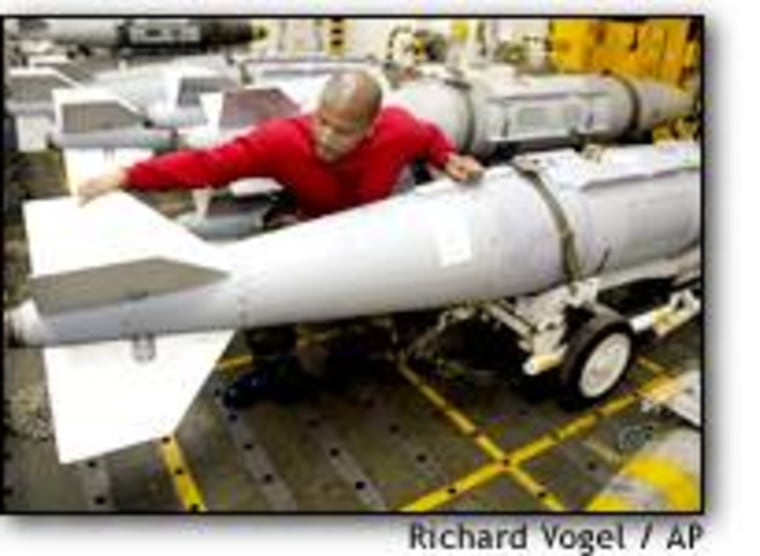The Global Positioning System started out decades ago as a satellite-based network for military location and navigation, but in the past few years it’s spawned a host of civilian applications — including high-tech direction-finders for automobiles and hikers. Now GPS is going to war again, raising questions about what happens on the homefront.
The U.S. military is using GPS as the backbone for its battlefield communication system, as well as the guidance system for a wide array of “smart bombs” — including the “Mother of All Bombs.”
Such satellite-based guidance systems aren’t foolproof, as was demonstrated during the Afghan war, but they’re considered far less vulnerable to the smoke and fog of war than the laser-guided munitions that played such a large role in the first Gulf War.
All this makes the GPS network, which relies on radio readings from a constellation of orbiting satellites, a powerful weapon — and a potential target — during any war in Iraq. Iraqi forces may well try jamming GPS signals, or “spoofing” GPS transmissions to lead the invading forces astray. Saddam Hussein’s troops also may be using GPS, or Russia’s less capable Glonass satellite navigation system, for their own purposes.
On Slashdot and other forums, GPS users have been debating whether the U.S. military will be “dumbing down” the satellite readings for civilians, as it once did. Until three years ago, civilian GPS readings were accurate only to a resolution of a football field or so — and that’s not good enough for today’s high-precision applications.
“Why screw with good people who vote, like me, by screwing with my toys here at home?” one journalist complained Wednesday on an e-mail discussion list.
Richard Langley, a University of New Brunswick geodesy professor who has studied GPS for 20 years, told MSNBC.com that civilian users probably have nothing to worry about.
Back in 2000, the U.S. military said it wouldn’t go back to the bad old days of “intentional degradation” of GPS signals. Instead, it would use more targeted tactics, including selective signal-jamming in the theater of military operations.
“People outside the theater can expect to use GPS as they have. ... Of course, national security overrides any statement that may have been made,” Langley said.
In a detailed set of “frequently asked questions,” Langley explains why the U.S. military still has the upper hand in GPS technology. Here are some of the strategies that could come into play during the conflict in Iraq:
Spoofing: The GPS network actually transmits two sets of locator signals: the civilian code, and an encrypted military code.
The Iraqis could conceivably send out “spoof” GPS-like signals that would fool the civilian-grade technology, but they wouldn’t have the “P code” used by the military.
“Ground troops have been cautioned not to rely on civilian GPS receivers because they can be spoofed. You wouldn’t want to rely on the coordinates from a spoofed receiver to coordinate live fire,” Langley said.
If the Iraqis are using GPS or Glonass themselves, Langley said U.S. troops could turn the tables on them.
“It’s not out of the realm of possibility that the U.S. could spoof them, and then the coordinates given by the (Iraqi) receivers would be in error,” he said.
Jamming: For a long time, low-cost GPS jammers have been widely available, and Iraqis have reportedly purchased such devices. The “pizza dish” antennas used for satellite-TV reception can even be hacked to jam GPS signals.
The fact that there are two GPS frequencies makes it harder to jam U.S. military equipment — and the Iraqi jamming signal itself would quickly attract U.S. fire.
“When the bad guys are picking jobs, (they) don’t want to pick ‘GPS jammer,’” Lt. Col. John Carter, chief of space requirements at the Pentagon, told Air Force Print News.
Even if the Iraqis were to jam GPS equipment on satellite-guided munitions, the bombs could switch to inertial navigation as a backup, Langley said.

“If they lose the GPS signal for any reason, jamming or otherwise, then they will resort to using the inertial navigation system alone,” he said. “That would still give them good accuracy — not quite as good as with GPS, but good enough to do the job.”
The U.S. military could well conduct its own jamming operation against the Iraqis if necessary, blocking out the civilian frequency while leaving the military frequency clear. However, that could cause problems for some of the Pentagon’s older GPS receivers, which depend on the civilian frequency to get an initial fix.
“The U.S. military may or may not decide to jam in Iraq,” Langley wrote in his FAQ. “The decision to do so will depend on whether or not they think the Iraqis are using GPS (would you really want to rely on your enemy’s system?) and whether or not its use would compromise their own operations.”
Anti-jamming: The U.S. military is also working to make it GPS equipment more jam-proof, on the ground and in the air. Antenna systems, for example, can sense the direction from which the jamming signals is coming, then cancel out that signal.
“Just because you’re transmitting the jamming signal, there’s no guarantee that the jamming is going to be successful,” Langley said.
Future GPS satellites will come with a more flexible transmission system that can be adjusted from the ground to overcome jamming, the Air Force said.
